Helping Children Cope with Separated Parents

Our parenting coach, Lena Engel, advises some practical first steps to help smooth the path to living separately.
Separation and divorce are all too often extreme and painful experiences in the lives of the adults involved, but they can be just as upsetting and earth-shattering for children in the family.
Despite the wide range of circumstances that have driven you to decide to separate, it is important not to forget that the decision was yours - the adults in the relationship. Your child cannot be blamed and should not be burdened by feelings of guilt.
What Does this Look Like in Practice?
If you and your partner have chosen to separate, it may be because your relationship has broken down and, sadly, there appears no likelihood of being able to work out difficulties.
In most of these cases there may be court agreements and arrangements put in place so that both of you have access rights to your child and have shared care. In some special cases where there are abusive relationships, one parent may have permanent care, but the other parent may have supervised access.
All these different arrangements are likely to cause stress to each of you and thereby place additional unseen stress on your child.
Accommodation
- Children can get used to having all sorts of new arrangements in two separate homes, if they have their own space and can feel that each parent is offering them equivalent access to the things they need. For instance, they need familiar objects to make them feel at home, as well as access to the support of each parent.
Timescales and Arrangements
- Children need to know that the arrangements are purposeful and make them feel valued by each parent. To enable this, it is important to create blocks of regular and predictable time which your child can get used to.
- Children can be encouraged with a visual timetable to remember when they will be moving between their parents. This enables them to prepare mentally and physically, taking what they need each time.
- You should share the information about your child’s immediate concerns and school information which may affect behaviour, or arrangements with school or friends.
- Beware that commitments in your work and private life need to be balanced when your child comes to stay with you. This can pose dilemmas for you and increased friction for your child.
Expectations for Your Child’s Care and Behaviour
- You and your ex-partner need to try to agree that your child will receive similar caring responses in each home otherwise your child might find re-adjusting to what is expected of them in each place difficult.
- For instance, it is useful to agree a set of rules that are mirrored in both homes. These could be basic agreements about keeping to specified bedtimes, and daily hygiene routines. Also, these may be about providing healthy home-cooked foods and drink.
- It's helpful for you both to agree that you will support your growing child to become independent in self-care, in areas such as dressing themselves and looking after their belongings, and little by little ensuring that they take part in doing simple chores in the home, such as setting the table and helping prepare food together.
- As your child develops, they need to feel supported in both homes to do homework and receive the attention they need to solve tricky problems.
Disagreements and Emotional Development
- There may be many reasons for the relationship between you and your ex-partner to be cold and emotionally upsetting, however, your child needs to feel loved and cherished despite any issues between you.
- It requires a great deal of commitment and control for parents who have separated to come to terms with your own emotions, let alone the needs of your child. However, it is essential that you remain, as much as possible, in control of your emotions in front of your child and do not badmouth each other, whatever the temptations to do so.
- To children, what really matters is that they feel equally well cared for in both homes and that once a routine has been put in place, it is consistent.
- It is very easy for children to pick up on their parents' emotional responses, so be aware that your child, for no good reason, can blame themselves for their parents' unhappiness. This can negatively affect their health and wellbeing.
- Be sensitive to changes in your child's behaviour and any difficulties they may be having at school because of the separation. It is helpful to tell teachers about your (and their) new situation and that you positively seek to minimise their discomfort.
- You need to have an open avenue of communication with the school to make clear the new arrangements for your child, and to identify with the school any additional support that may be needed in certain cases.
---
Lena Engel
For more information, take a look at our Insider Guide on Divorce.
Webinar on Life After Separation and Divorce
Or contact our Speak to an Expert service for personal advice.





